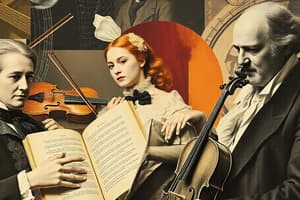Podcast
Questions and Answers
What is Romantic music?
What is Romantic music?
- A genre of music emphasizing medieval themes
- A form of modern jazz music
- An era of classical music that began in the late 18th century (correct)
- A style of music focusing on electronic instruments
Who is considered the greatest composer of all time?
Who is considered the greatest composer of all time?
Ludwig van Beethoven
When was Johannes Brahms born?
When was Johannes Brahms born?
May 7, 1833
What did Franz Liszt contribute to music?
What did Franz Liszt contribute to music?
Who was Robert Schumann's wife?
Who was Robert Schumann's wife?
What era was Frédéric Chopin associated with?
What era was Frédéric Chopin associated with?
What nationality was Mikhail Glinka?
What nationality was Mikhail Glinka?
What is Edvard Grieg known for?
What is Edvard Grieg known for?
What was Giuseppe Verdi's contribution?
What was Giuseppe Verdi's contribution?
Who were The Five?
Who were The Five?
What was César Cui's profession besides being a composer?
What was César Cui's profession besides being a composer?
What musical innovations is Modest Mussorgsky known for?
What musical innovations is Modest Mussorgsky known for?
What was Nikolai Rimsky-Korsakov known for?
What was Nikolai Rimsky-Korsakov known for?
What is Alexander Borodin known for besides being a composer?
What is Alexander Borodin known for besides being a composer?
What role did Mily Balakirev play in Russian music?
What role did Mily Balakirev play in Russian music?
Flashcards are hidden until you start studying
Study Notes
Romantic Music
- An era of Western classical music that began in the late 18th or early 19th century, linked to the broader Romanticism movement.
- Romantic music became more expressive, focusing on literature, art, and philosophy.
- Prominent composers included Beethoven, Schubert, Schumann, Chopin, Mendelssohn, Bellini, and Berlioz.
Ludwig van Beethoven
- Born around December 16, 1770, in Bonn, Germany.
- Widely regarded as the greatest composer of all time.
- Pioneered innovations in sonatas, symphonies, concertos, and quartets.
- Struggled with deafness; composed significant works in his later years.
- Died in 1827 at the age of 56.
Johannes Brahms
- Born on May 7, 1833, in Hamburg, Germany.
- Master of symphonic and sonata styles during the late 19th century.
- Viewed as a continuation of the Classical tradition established by Haydn, Mozart, and Beethoven.
Franz Liszt
- Born on October 22, 1811, in Raiding, Hungary.
- A child prodigy who started performing at age 9.
- Authored over 700 compositions and revolutionized modern piano techniques.
Robert Schumann
- Born on June 8, 1810, in Zwickau, Germany.
- Known for his piano music, songs (lieder), and orchestral compositions.
- Many works were dedicated to his wife, pianist Clara Schumann.
- Died on July 29, 1856.
Frédéric Chopin
- Born on March 1, 1810, in the Duchy of Warsaw.
- Renowned for solo piano music with unparalleled technical skill.
- A child prodigy who left Poland at 20, shortly before the November Uprising.
- Died on October 17, 1849.
Mikhail Glinka
- Born on June 1, 1804, and died on February 15, 1857.
- The first Russian composer recognized in his homeland; often called the father of Russian classical music.
- Influenced later Russian composers and initiated a distinct Russian musical identity.
Edvard Grieg
- Born in June 1843 and died on September 4, 1907.
- A significant composer who integrated Norwegian folk music into his works.
- His compositions fostered national identity and are widely celebrated, including his contributions to the standard classical repertoire.
Giuseppe Verdi
- Born on October 9 or 10, 1813, and died on January 27, 1901.
- Italian opera composer, dominating the opera scene post-Bellini, Donizetti, and Rossini.
- Famous operas include "Rigoletto," "Il trovatore," and "La traviata."
The Russian Five (The Mighty Handful)
- A group of five Russian composers: César Cui, Aleksandr Borodin, Mily Balakirev, Modest Mussorgsky, and Nikolai Rimsky-Korsakov.
- Formed in the 1860s to establish a genuine Russian musical identity, moving away from European influences.
César Antonovich Cui
- Russian composer and military officer of French, Polish, and Lithuanian descent.
- Known for promoting a uniquely Russian music style as part of The Russian Five.
Modest Petrovich Mussorgsky
- A composer who contributed to defining Russian music through works based on folklore and history.
- Notable compositions include "Boris Godunov," "Night on Bald Mountain," and "Pictures at an Exhibition."
Nikolai Rimsky-Korsakov
- A prominent Russian composer and orchestrator within The Russian Five.
- Renowned for “Capriccio Espagnol,” “Russian Easter Festival Overture,” and “Scheherazade.”
- Merged Russian musical elements with Western techniques.
Alexander Porfiryevich Borodin
- A composer of Georgian origin, also a doctor and chemist.
- Known for his symphonic works and the opera "Prince Igor."
- Advocated for women's education and founded a medical school for women.
Mily Balakirev
- Conductor and composer who advanced musical nationalism in Russia.
- Helped unify The Russian Five and influenced contemporaries like Tchaikovsky.
- Promoted folk music integration with classical styles.
Studying That Suits You
Use AI to generate personalized quizzes and flashcards to suit your learning preferences.




